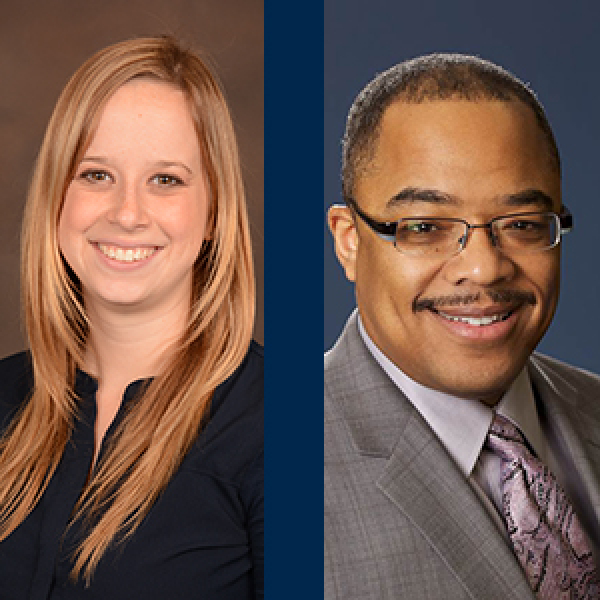Drs. Kelling and Walker Named Interprofessional Leadership Fellows

This article was originally posted by the Michigan Center for Interprofessional Education.
Sarah Kelling, PharmD, MPH, and Paul Walker, PharmD, join educators from across the health sciences in the second cohort of U-M’s prestigious IPE faculty development program.
“Because creating a collaborative culture and developing University of Michigan faculty to teach in innovative learning environments are critically important goals, we are very pleased to announce this strong new cohort of Interprofessional Leadership Fellows,” says Frank Ascione, director of the Michigan Center for Interprofessional Education.
Dr. Kelling is a clinical assistant professor of pharmacy at the U-M College of Pharmacy. She received her PharmD and MPH degrees from Northeast Ohio Medical University. Following graduation, she completed a community pharmacy residency with Kroger and Ohio Northern University. She provides transition of care services at the Turner Geriatric Clinic associated with U-M. Her research interests include the scholarship of teaching and learning as well as the accessibility and utilization of outpatient clinical pharmacy services.
Dr. Walker is a clinical professor and director of Experiential Education and Community Engagement at U-M College of Pharmacy, and manager of pharmacy patient outcomes in the Department of Pharmacy Services at U-M Health System. He received his BS in Pharmacy and PharmD degrees from Wayne State University. He completed residency in pharmacy practice at Children’s Hospital of Michigan and specialty residency in pediatric pharmacy practice at the University of Tennessee. His scholarship focuses on pharmacy practice model development, assessing the impact of pharmacists on patient outcomes, and experiential education. He is especially interested in implementing intentional IPE activities in the experiential curriculum and has coordinated IPE educational activities for pharmacist preceptors.
Seventeen University of Michigan faculty members have been named to the second cohort of U-M’s Interprofessional Leadership Fellows, a program launched in January 2016 to build the capacity of interprofessional educator/scholars, so they can be effective leaders and change agents. The motivated group of faculty from across the health sciences will be provided with opportunities to learn from and work with academic and practice leaders at the university and national level.
The fellows represent the U-M School of Dentistry, School of Kinesiology, Medical School, School of Nursing, College of Pharmacy, School of Public Health, School of Social Work, Taubman Health Sciences Library, and U-M Flint. During the 18-month program, participants will attend one of several national Interprofessional Faculty Development Program workshops, which were created with support from the Josiah Macy Jr. Foundation.
“These trainings will expose our faculty to a national network of peers and leaders,” says Dr. Ascione. “The scope of our engagement, and our commitment to developing faculty change agents, will also help position the university as an emerging leader in interprofessional education.”
In addition to the national trainings, fellows will participate in a campus-based interprofessional learning community facilitated by the Center for Research on Learning and Teaching (CRLT).
“CRLT is pleased to be working with a second cohort of Interprofessional Leadership Fellows,” says CRLT executive director Matt Kaplan. “The program builds on the success of last year’s pilot, and is based on research that indicates the power of sustained communities of practice to create effective and long-lasting organizational change.”
Throughout the program fellows will be assigned to multidisciplinary teams. They will focus on developing and implementing interprofessional education or practice projects relevant to IPE goals, and the projects will be implemented in the next school year.
The Interprofessional Leadership Fellows program is funded by the Michigan Center for Interprofessional Education with support from the provost’s Transforming Learning for the Third Century Initiative, and the deans of the seven health science schools located in Ann Arbor: School of Dentistry, School of Kinesiology, Medical School, School of Nursing, College of Pharmacy, School of Public Health, and School of Social Work.




